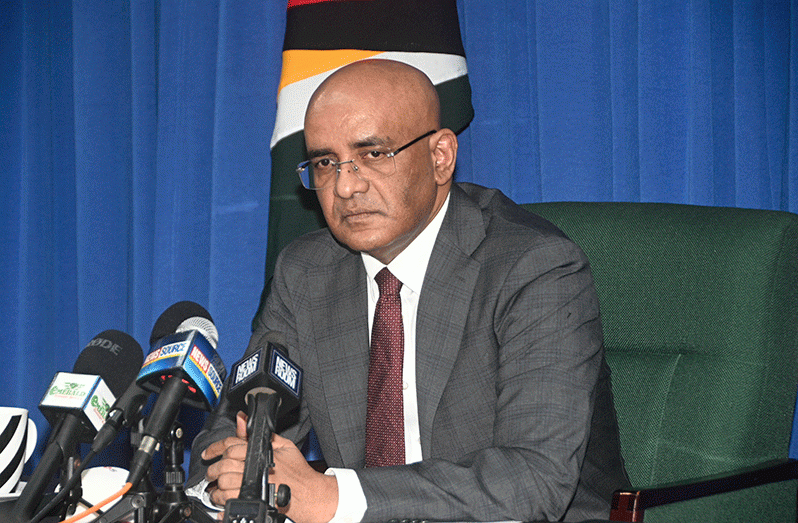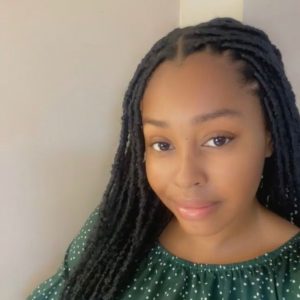Dr Jagdeo says, blasts Venezuelan VP for ‘blatant lies’
By Trina Williams
VICE-PRESIDENT, Dr Bharrat Jagdeo, on Thursday slammed the Venezuelan Vice-President, Delcy Rodriguez, for spreading “blatant” lies and painting themselves as victims while their actions have stated otherwise.
During a press conference at the Office of the President, Dr Jagdeo maintained: “We’ve never threatened the peace… Venezuela has been an aggressive country.”
Dr Jagdeo further said: “I’ve seen the vile rhetoric from Delcy Rodriguez, calling President Ali names… And I think Delcy Rodriguez cannot speak with such certainty when you talk about providing food for people or jobs for them because you have thousands of people fleeing their country.”
He then went on to say: “If she [Venezuela’s Vice President] thinks we are going to roll over and succumb to their imperialist ambitions in Guyana, then they’re false.”
Highlighting the fact that the Venezuelan government had issued stamps and maps with their correct boundaries, which does not include Essequibo, Dr. Jagdeo said that this fact now poses as an “inconvenient truth” to the current Nicolas Maduro administration.
“There has been a huge concern in our country given Venezuela’s aggressive positions on our border, and their entire campaign historically, but more recently, has been based on misinformation and lies,” the Dr. Jagdeo firmly said.
While reflecting on the facts of the Guyana-Venezuela controversy, the Vice-President said: “For over 60 years those borders remained unchanged until they raised a false allegation that there was some corruption at the tribunal. After that, the Geneva Agreement was signed,” adding that the purpose of the Geneva Agreement was to deal with Venezuela’s falsehood that the 1899 Arbitral Award was flawed.
In 2018, Guyana took a decisive step by approaching the International Court of Justice (ICJ), seeking affirmation of the legitimacy of the 1899 Arbitral Award.
Venezuela, taking a defiant stance, initially claimed that the ICJ lacked jurisdiction, a contention flatly rejected by the international court in a crucial ruling in December 2020. The door was thus opened for the ICJ to delve into the merit of the substantive case.
Even as this substantive case remains before the court, Guyana contends that the recent announcement of a referendum by Venezuela is a thinly veiled attempt by the Bolivarian Republic to gather support for abandoning the ongoing ICJ proceedings, and unilaterally assert control over the Essequibo region.
In response, Guyana swiftly approached the ICJ seeking urgent provisional measures to prevent any action by Venezuela that could jeopardise the status quo until the court reaches a final verdict on the matter.
The ICJ is expected to rule soon on Guyana’s request for provisional measures to prevent Venezuela from proceeding with its planned referendum on the Essequibo. Meanwhile, the substantive case, highlighting the historical context and the 1899 Arbitral Award, remains before the court.
Rodriguez had, however, expressed her nation’s complete disregard for the authority of the International Court of Justice (ICJ) in addressing the ongoing border controversy with Guyana.
She expressed her country’s position during the ICJ’s hearing of Guyana’s request for provisional measures, to restrict any action that would result in the annexation of the country’s Essequibo as a result of the upcoming referendum.
In her presentation to the World Court on November 15, the Venezuelan Vice-President, in defiance, began her presentation by emphasising that Venezuela’s participation in the hearing should not be misconstrued as recognition of the ICJ’s jurisdiction over the territorial controversy concerning “Guayana Esequiba.”
“I wish to begin by emphasising that our participation in this hearing in no way implies recognition of the jurisdiction of this honourable court over the territorial dispute concerning Guayana Esequiba…,” she said.
Rodriguez went on to tell the World Court: “Nothing will prevent the referendum scheduled for the December 3 from being held.”
Venezuela’s position is contrary to the stance of CARICOM, the Commonwealth, the United Nations, the Organization of American States (OAS), and other reputable institutions and countries, which have expressed their firm views that the judicial process should be respected as a solution to the controversy.



.jpg)









